
A delegation from Manchester United in 1990 at the Redcastle Hotel, where the team stayed, alongside staff members including Gerard and Eileen McLaughlin. Photos: Derry Journal
August 1990. 35 years. While not quite the clichéd blink of an eye, when you compress the passage of time into such a pitiful sounding period of time, it does strike you how quickly time can pass. The advent of a decade nostalgically remembered as something of a golden era.
In terms of world events, the Middle East was as restive as it is today. Iraq, under the leadership of Saddam Hussein, invaded Kuwait. This would pave the way for the Gulf War, when American troops would be deployed to retake the country from the Iraqi’s. Scud missiles, Desert Storm, Norman Schwarzkopf, names imprinted on the memory.
The Troubles still raged in the North. Just the previous month, the IRA killed Ian Gow, a British MP and close ally of Margaret Thatcher, assassinated by a car bomb outside his home in East Sussex. The end of the conflict seemed as far off as ever.
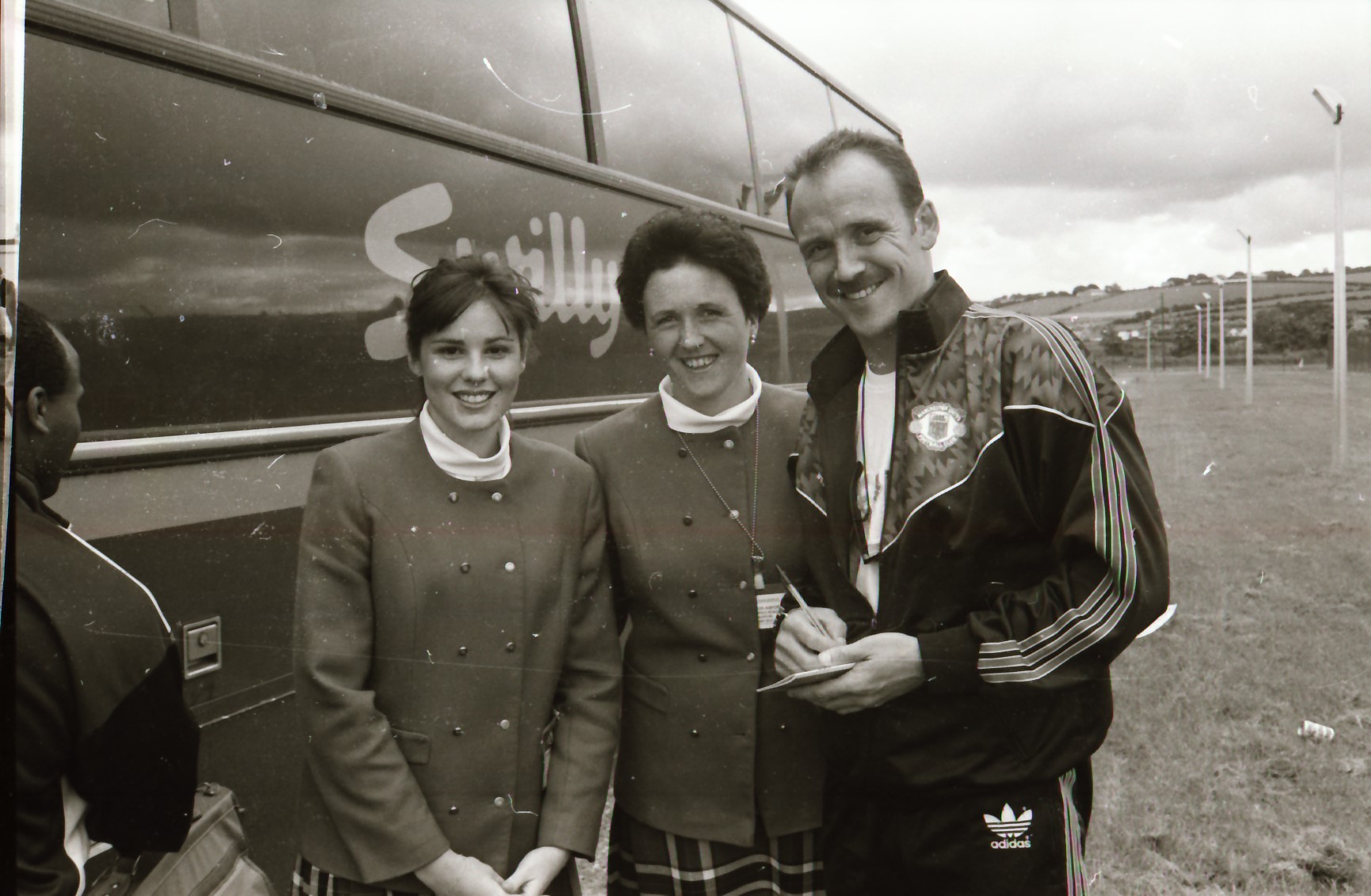
To me, turning 14 at the end of that August, the events of The Troubles were a backdrop to my life growing up. Living in Muff in Donegal, a village that sits on the border with Derry, it was impossible not to be constantly aware of it, but at the same time, removed.
You were conscious of that demarcation line, a buffer, a separation point that differentiated a place of conflict and a place of normality. In a conversation I once had with Tony Doherty, son of one of the victims of Bloody Sunday, Paddy Doherty, and a native of Derry, he remarked that once you crossed that border, it was like “breathing different air”. The news was a cycle of death and destruction linked to the conflict.
Despite our proximity, we were insulated. We would experience small instances filtering into our daily lives but sieved of any sense of threat. Getting the Lough Swilly bus into the city, you passed through the British army checkpoint at Culmore. Speed ramps would slow your entry.
READ NEXT: Michael Carr gets his Ulster medal - 51 years later
If you sat toward the back of the bus, you’d be bumped out of your seat for a second by those ramps. The green metal exterior, the watchtower with the tinted bomb-proof glass, soldiers in army fatigues carrying machine-guns. Sometimes they would get on to perform a perfunctory search of the bus, but it was more of a case of performing a routine than from there being any real threat. (Coshquin, another of these checkpoints a few miles away in Bridgend, would be blown up by the IRA later that year, Patsy Gillespie chained to the steering wheel of a van loaded with explosives.)
Wandering around the city centre, there were ever-present Saracens on patrol. A helicopter seemed to take up a permanent position in the skies. And every so often, the dull whump of an explosion could be heard in the distance. You would pause for a moment, stopping what you were doing, asking yourself, was it what you thought it was, before carrying on with your life. The notion of an end to the intractable conflict seemed a forlorn hope at the start of that decade.
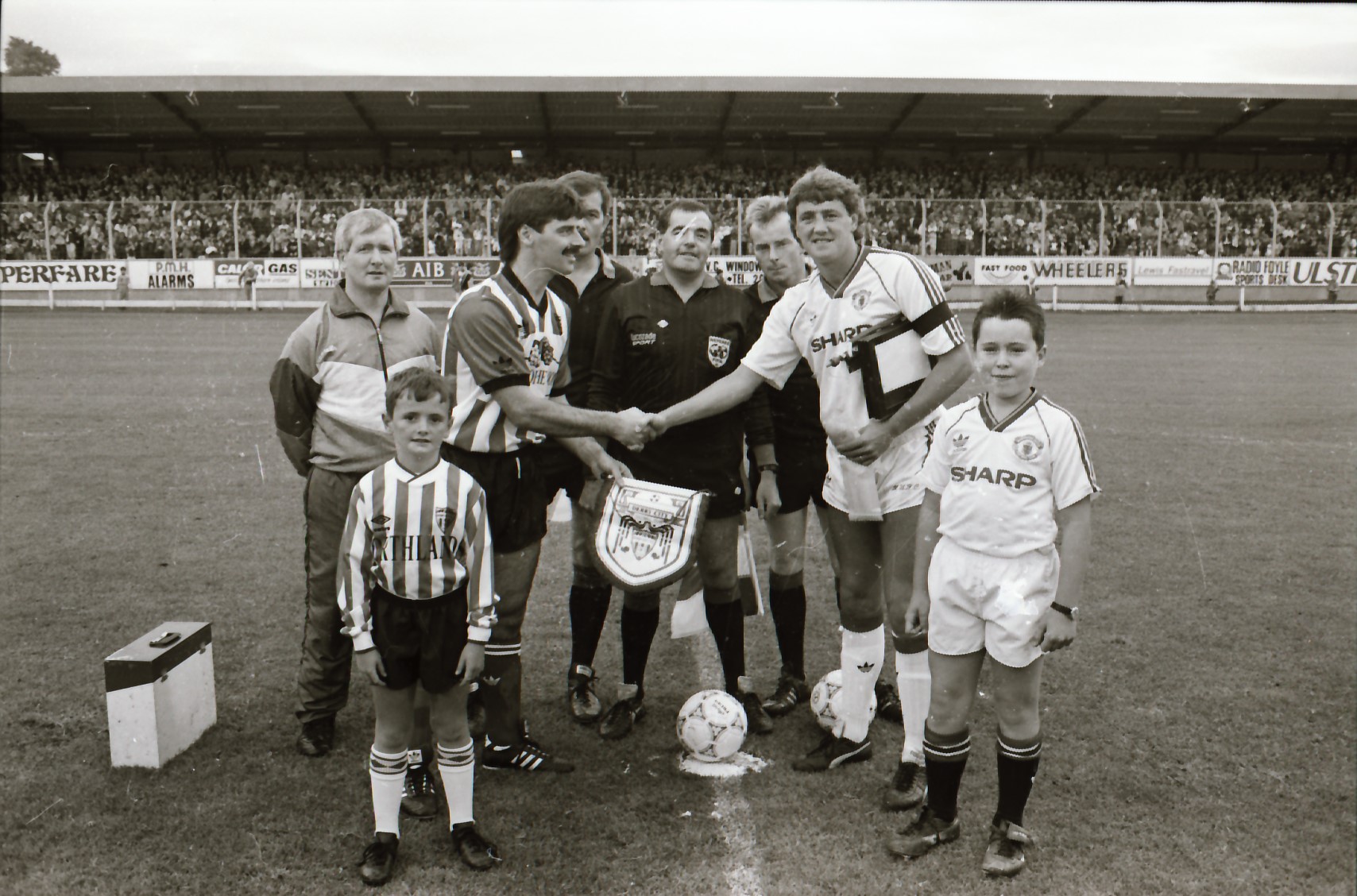
1990 was also the year I discovered football in a big way. I’d always been fairly bookish at primary school, competitive sports not my thing. I joined secondary school in September of 89, and to say my academic sensibility didn’t really prepare me that well for the transition is something of an understatement. I was lost. Whereas I’d been happy in my own company before, knowing my place exactly, now I felt the social sting of not quite fitting in. Life suddenly moved at a pace I wasn’t prepared for. I had to find a way to build to keep up.
That’s when football finally clicked with me. Up to then, football had been twenty-two men running around a pitch after a bag of wind (to quote one local man’s apt description of it). Now I recognise the skill, competitiveness, positional play, team shapes, and rules. Developing a love for football helped me join social groups that I’d always felt slightly excluded from beforehand. I developed a new language, a vocabulary that allowed me to fit more easily into the social circles of young teenage boys.
It helped that I was a Manchester United supporter and 1990 was the beginning of the journey of the glory years of the club under Alex Ferguson. I would have said I supported Man United because that’s who my dad supports. He’s loved them since the days of Best and Charlton and Law. Fealty to my father was expressed not in words but club colours.
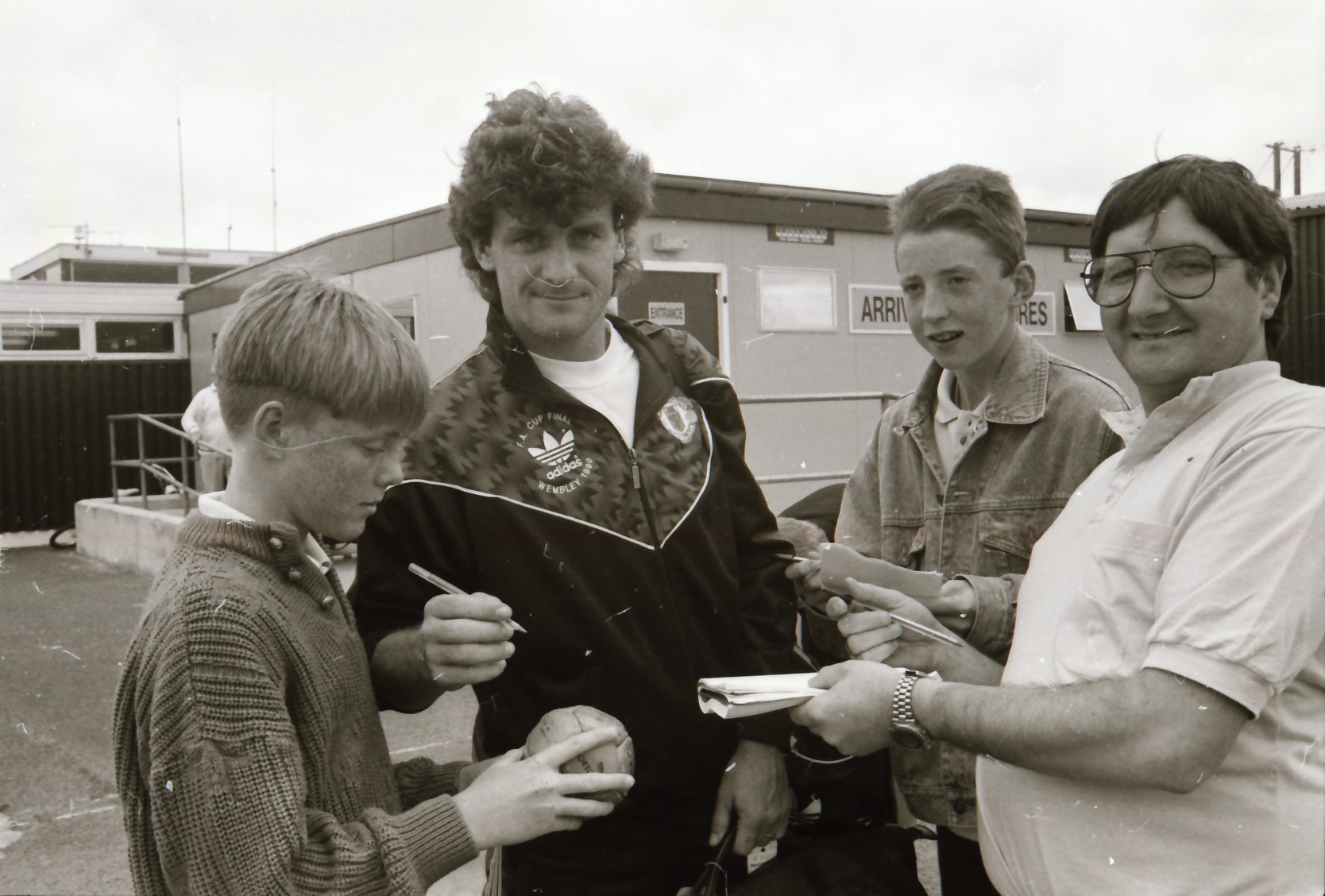
In May of that year, they reached the FA Cup final. It was one of the first full games of football I think I sat through. Lots of goals, the excitement of a final, it was easy to get swept up in the drama of the game. The first match ended as a 3-3 draw against Crystal Palace. It was notable for the introduction of Ian Wright onto the stage as a player of immense talent and scoring ability (unfortunately, not for United). He came on as a substitute to score two of Palace’s goals.
This was a time when finals would be replayed after a draw. United would eventually triumph, Lee Martin scoring the only goal of the replay. It was the first trophy the team won under Ferguson and would help pave the way to many years of huge success.
That summer would also see the Republic of Ireland compete at Italia 90. The fever pitch of those heady summer days lingers in the memory. The whole country seemed to be lifted by what was happening in Italy, and you could feel a sense of the possible in the air. The possibility of what I never knew, but there was a tangible shift in mood. Life didn’t feel so closed in. Here we were, on a world stage, more than holding our own.
READ NEXT: Donegal teen to attempt Bundoran-Mountcharles bed push for Little Blue Heroes
The big man from Donegal, Packie Bonner, became a national hero, along with the rest of the squad who distinguished themselves over those amazing few weeks. I remember my mother, who never had much interest in football, standing glued to the TV that Monday afternoon, a pair of yellow Mairgold rubber gloves on, holding the potatoes she was peeling for dinner, alongside my younger brothers, to see Bonner pull off his famous save and O’Leary stepping up to score the winner. Suddenly, the Irish flag, more renowned for being draped over the coffins of dead Republicans, could be something that was waved as a symbol of Irish pride.
It was against the backdrop of these events that Manchester United would play Derry City in a friendly in August of 1990. An Irish tour in preparation for the 90/91 season, that took in games to Cork City, Bohemians and Waterford, United would play to a packed Brandywell stadium on Wednesday, 8th August. Kick-off at 7.30.
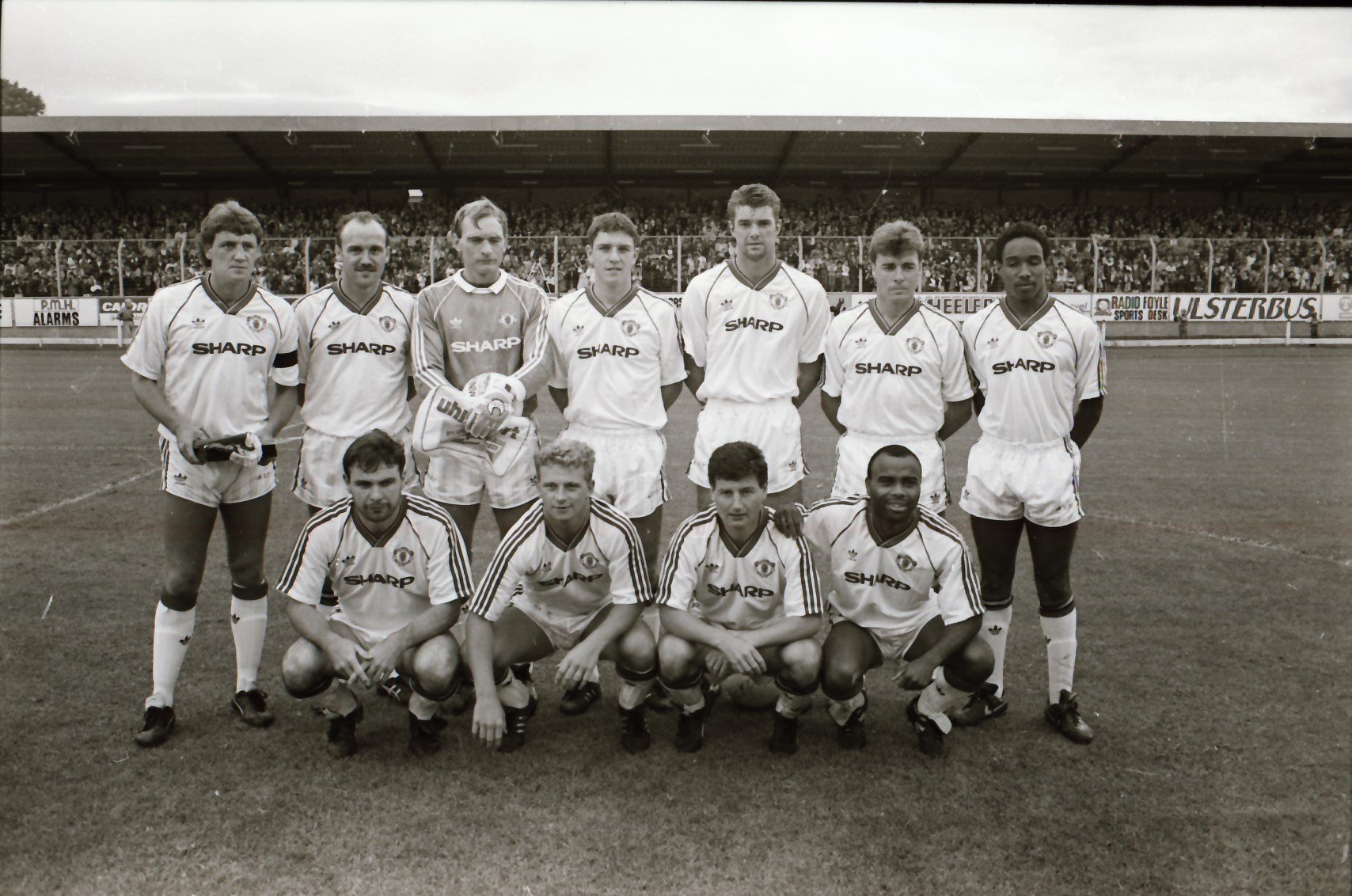
I didn’t have a ticket. My Dad did. As with all friendlies, it wasn’t exactly a classic. That’s according to my Dad. The game ended in a 1-1 draw. Mark Robins scored a late equaliser for United. Hardly setting the world on fire for the season ahead. When Dad came home and I asked him about it, he wasn’t exactly enthused. He’s never really gone in for friendlies. Like any supporter, he wants to see matches played with full thunder. It was also “teeming raining”, which didn’t really add to his enjoyment of the experience.
As a way to round out his evening, he went to the local pub, The Squealin’ Pig. Nothing too unusual about that. I was sitting at home aimlessly channel hopping on the TV until I found something worth watching. My older brother was working in the local chipper. The rest of the family had gone to bed, so I was there on my own. The curtains were closed to the world outside.
And then it was I could hear the heavy tramp of my father running around the path of the house. Instinctively, I knew it was him. My father has never been a runner. He’s always been sturdy, “carrying a bit of timbre” as one of my brothers so eloquently puts it on occasion.
The only other time I saw my father attempting to run was in a friendly football match at the local festival one year. He was on the pitch about 10 minutes, lumbered up and down the line a few times, and then promptly sprained his ankle after stepping in a hole, and had to be carried off to be attended by local first-aiders. He spent the next few days with heavy strapping on his ankle. Running has never been his forte. And yet here we were. My father was running.
When things like this happen, irruptions into the mundanity of daily life, the mind sometimes flashes to things that are usually never good. I was immediately telling myself, someone has died, and he’s rushing home to tell us. We didn’t have a phone in the house and if someone wanted to contact us a phone call would go to the pub or to one of the neighbours to pass on a message, so it wasn’t an entirely unreasonable assumption. Before he burst in through the back door of the house, I was instinctively preparing myself for the bad news he was going to inevitably bring. And news he did have. But not what I was expecting.
Breathless, he just about spluttered out, “Man Utd are in the Pig. Come on! The whole team are up there!”
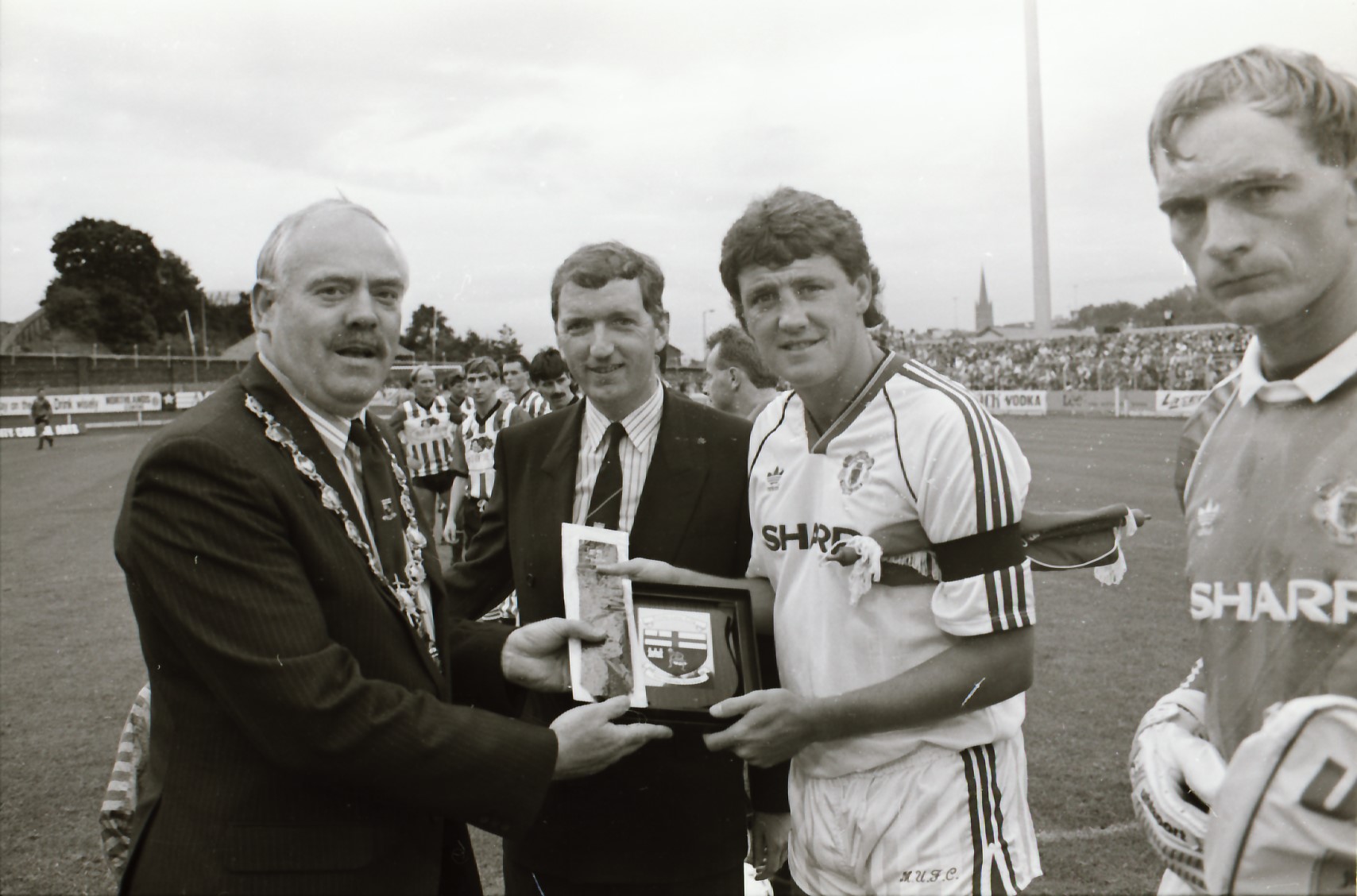
He didn’t wait for a response, but was motoring straight back out the back door, and up the street to the pub. I’m not sure how I responded to him. For a brief second it was as if I’d entered a slightly altered reality. Man Utd. The football team. The FA Cup winners. One of the most famous clubs in the world. In the local pub of a small village. You’re having me on, I thought to myself. But my father is not a man given to practical jokes. He was 100% in earnest.
I threw on different clothes to go to the pub, not quite believing what was happening. I grabbed a copy of a magazine that was one of those free supplements that came with newspapers, profiling each of the teams for that summer’s World Cup. It was the only thing related to football that was to hand. Part of me was thinking this is all some kind of misunderstanding as I ran the few hundred yards up the street. It might be one or two players, but no way it was the team. Da had been mistaken somehow, or I’d interpreted his message wrong. Something wasn’t adding up. There was no way they’d all just be sitting in the Pig.
I’d been in the “wee bar” as the locals still call it, only once or twice beforehand. The wee bar was for the regulars, not just the weekend drinkers. At 13, bars were mysterious places to me, somewhere adults went to socialise and drink alcohol. I’d been brought a few times inside The #matador, the other pub in the village, long since closed, but I don’t remember being in the bar of the Pig before. I approached the dark wooden door with a healthy dose of apprehension. My doubts still persisted. I could hear noise from inside
Usually, on a night during the week, you would have a small crowd. That night, the place was absolutely thronged. And the first people who I met walking in the door, standing there chatting with pints in their hands, as if they always stood there of a weeknight, were Brian McClair, Steve Bruce and Mark Hughes. It was one of those double-take moments in my life. I paused for a second, having to tell myself that this was really happening.
The United team were in our local pub. (My father maintains it was Mal Donaghy and Clayton Blackmore who were standing at the door. I tell him that may be who it was when he walked in, but it was the aforementioned trio who I most vividly remember.)
That team comprised many stars. As well as the trio standing by the bar, you had Gary Pallister, Danny Wallace, Lee Sharpe, the “Guvnor” Paul Ince, Mike Phelan, and Mark Robins, the man whose goal in an earlier round helped propel Ferguson’s team to the FA Cup success that season. Denis Irwin, one of Ferguson’s greatest signings for the club, would be signed that summer and was yet to join the squad.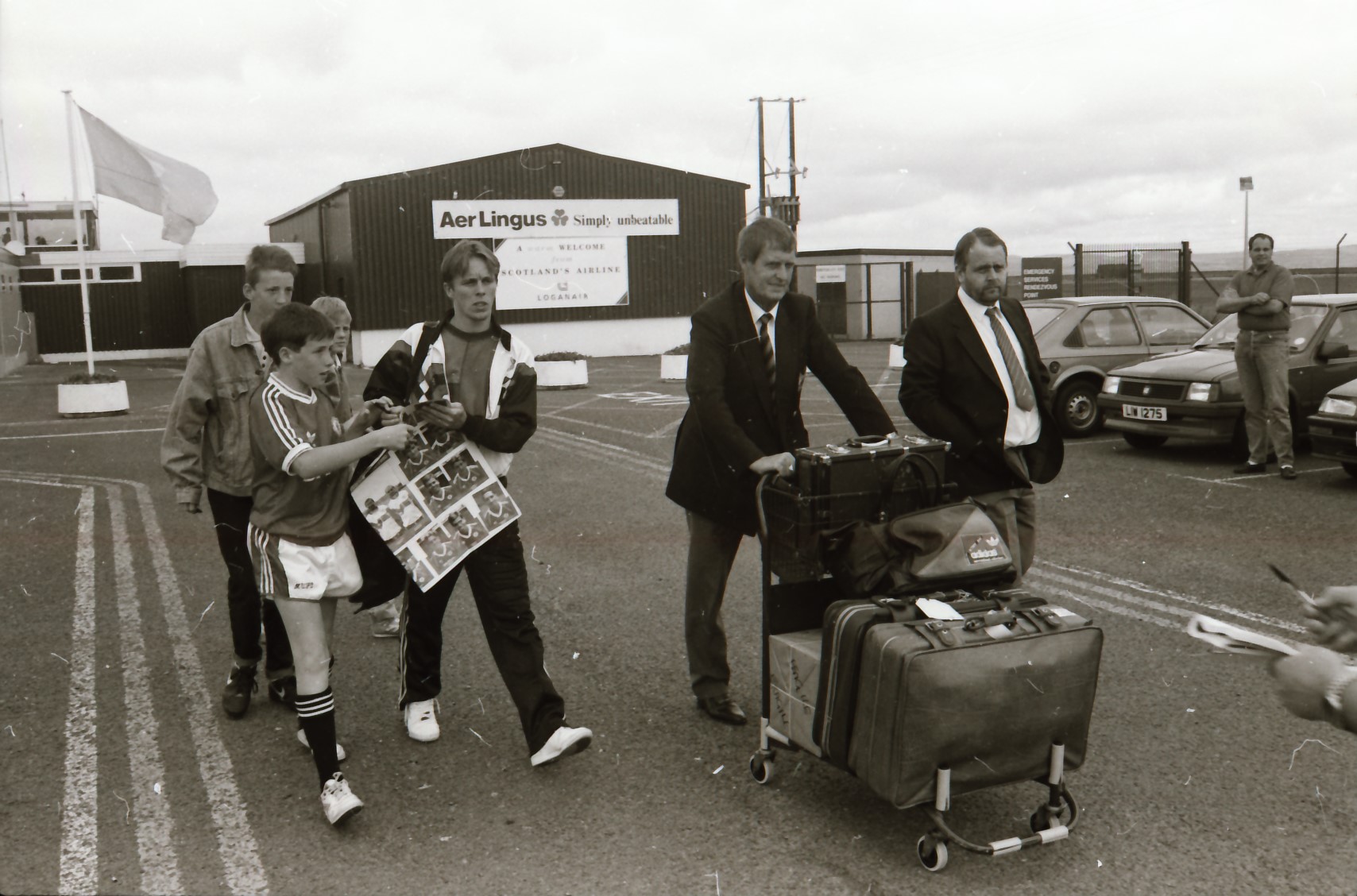
Bryan Robson was the club captain at the time. Because of injury, he hadn’t travelled. He was one of the few players not there. Ferguson was also a notable absence, having already gone ahead to the hotel they were staying at, leaving the players to enjoy themselves. Bruce, who was captain in the absence of Robson, was responsible for the money for the team. And they weren’t shy about spending it. They cleaned the place out of snacks and quite a lot of drinks.
There is the old saying that you shouldn’t meet your heroes. Maybe that applies in certain circumstances, but certainly not for me that night. I remember the convivial atmosphere. A bunch of young men with several star-struck locals mingling around them. The players, politely signing autographs while having a laugh with each other. Maybe it’s nostalgia, but looking around me, I felt this sense of euphoria at the time, an unalloyed happiness that was shared by those who were there with me. There was no sense of sharing a space with the superstars of football. These young men were down-to-earth.
There was none of the prima donna behaviour that seems to characterise the behaviour of modern young footballers. My father always maintains that Pallister and Bruce were one of United’s best centre-back pairings. Some of me thinks he’s partly right (it’s Ferdinand and Vidic for me). Another part of me thinks his admiration stems from the fact that after meeting these men, they were such normal, reasonable people that night.
My Dad ended up behind the bar, helping the overwhelmed landlady, Mary McCorkell, to serve drinks. One local, Fred Horner, with little interest in football, surveyed proceedings as he sat in his regular corner, his quiet Thursday night drink interrupted by this bunch of strangers. Determined to join in, despite being several drinks into his evening, he turned to one of the players and politely asked, “So which team do you play for, youngfella”? This despite the fact that the players were in matching tracksuits with the team name printed on them.
One of the memories that sticks with me was that of Les Sealey sitting apart from the other players. Sealey had replaced Jim Leighton as goalkeeper for the FA Cup final replay. Leighton (who was also present in the Pig that night) was deemed to have been responsible for two of the three goals that he conceded in the 3-3 draw that was the first game. He was unceremoniously dropped by Ferguson for the replay to be replaced by Sealey, who was on loan from Luton. I’m not sure if it had created tension among the players, where his teammates were unhappy at the treatment of Leighton, or if he saw himself as the outsider, just feeling his way into the team, having essentially only played a few competitive games.
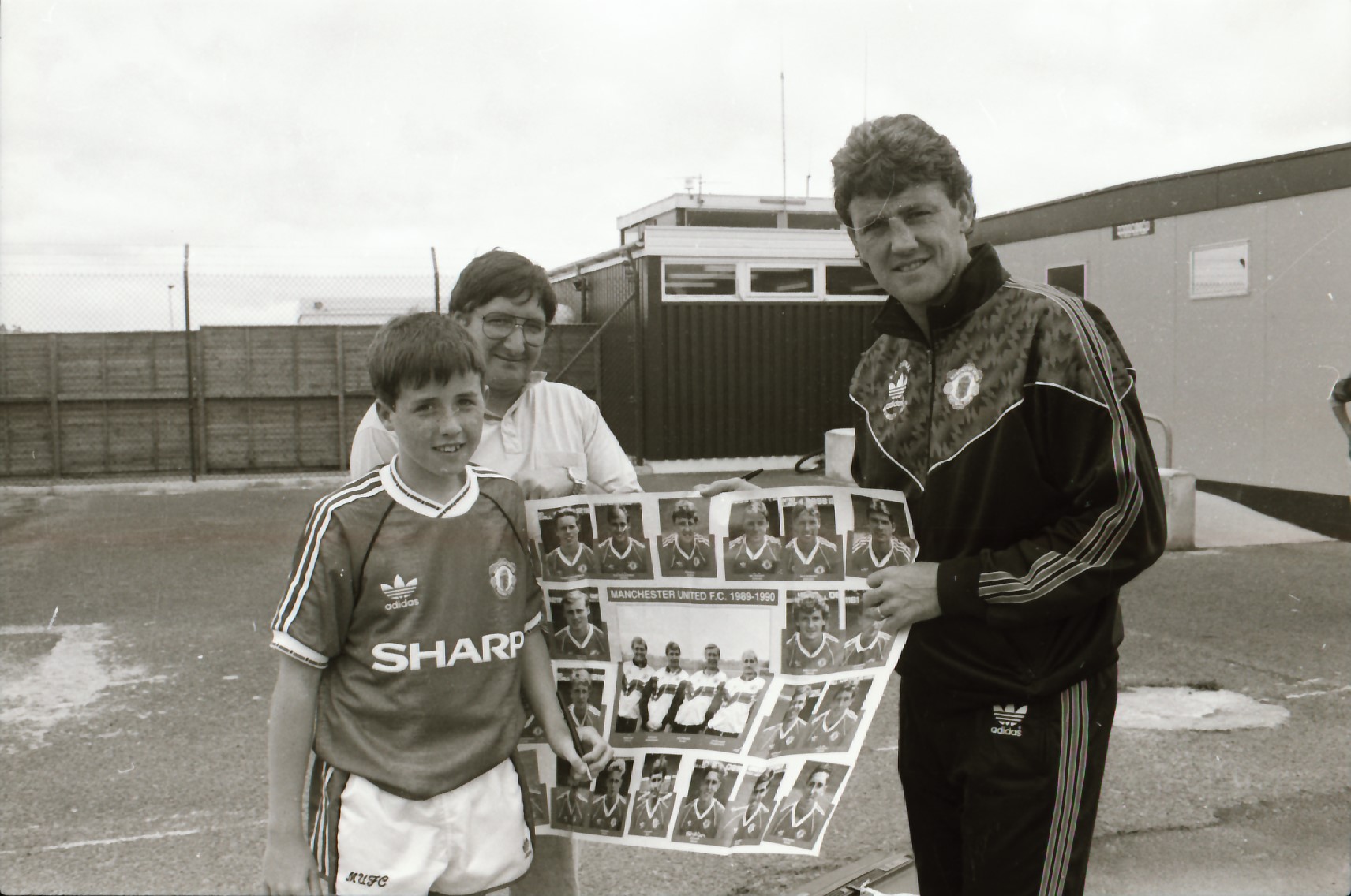
Not having quite turned 14 yet, the dynamics of interpersonal relationships and reading a room were beyond me. All I knew was that he sat apart. I thought he looked a bit bewildered, not sure how he had quite got there himself. He wasn’t quite sure how to deal with all this adulation. For this socially awkward teenager, trying to fit in, I saw someone I could relate to. Sealey would go on to become something of a cult player for Utd. Sealy tragically would die in 2001 at the young age of 43 from a heart attack. I remember the goalkeeping jersey he wore for the 90-91 season was one of the first replica football tops I ever owned.
This all took place before the time of mobile phones that could have recorded the moment in a deluge of selfies and social media posts. Somebody was sent to try to get a camera to capture the moment in pictures, but no camera was ever produced. No record of the night exists in images. It all now lingers only in memory. I’ve lost the magazine on which I got all the signatures. Whenever I looked at them, I could only make out a few of the names. The Rosetta Stone would have been required to decipher them; the handwriting of so many of them was illegible.
As the night wore on, more people heard about the famous guests and started arriving. Some started asking them for the tracksuits they wore (it wasn’t anyone local). And with this shift in mood, the team rose as one and departed. I remember standing by the bus as it departed, feeling privileged and bewildered, not quite believing what had just transpired.
It takes on the quality of a dream. Did that actually happen? Did the Man United team actually show up in this little sleepy village pub and sit with the locals, having the craic, before making their way. It is only because there were others there who shared in the experience that I trust myself to believe in it.
Why were they there? It turned out the team were all staying in the Redcastle Hotel, about 10 miles further down the Inishowen peninsula from where we were in Muff. After finishing the match against Derry City, the team bus would have carried the players through the village. It still being pre-season and it being the 90’s and long before lifestyle and performance levels became intertwined in players’ fitness, they wanted a few pints.
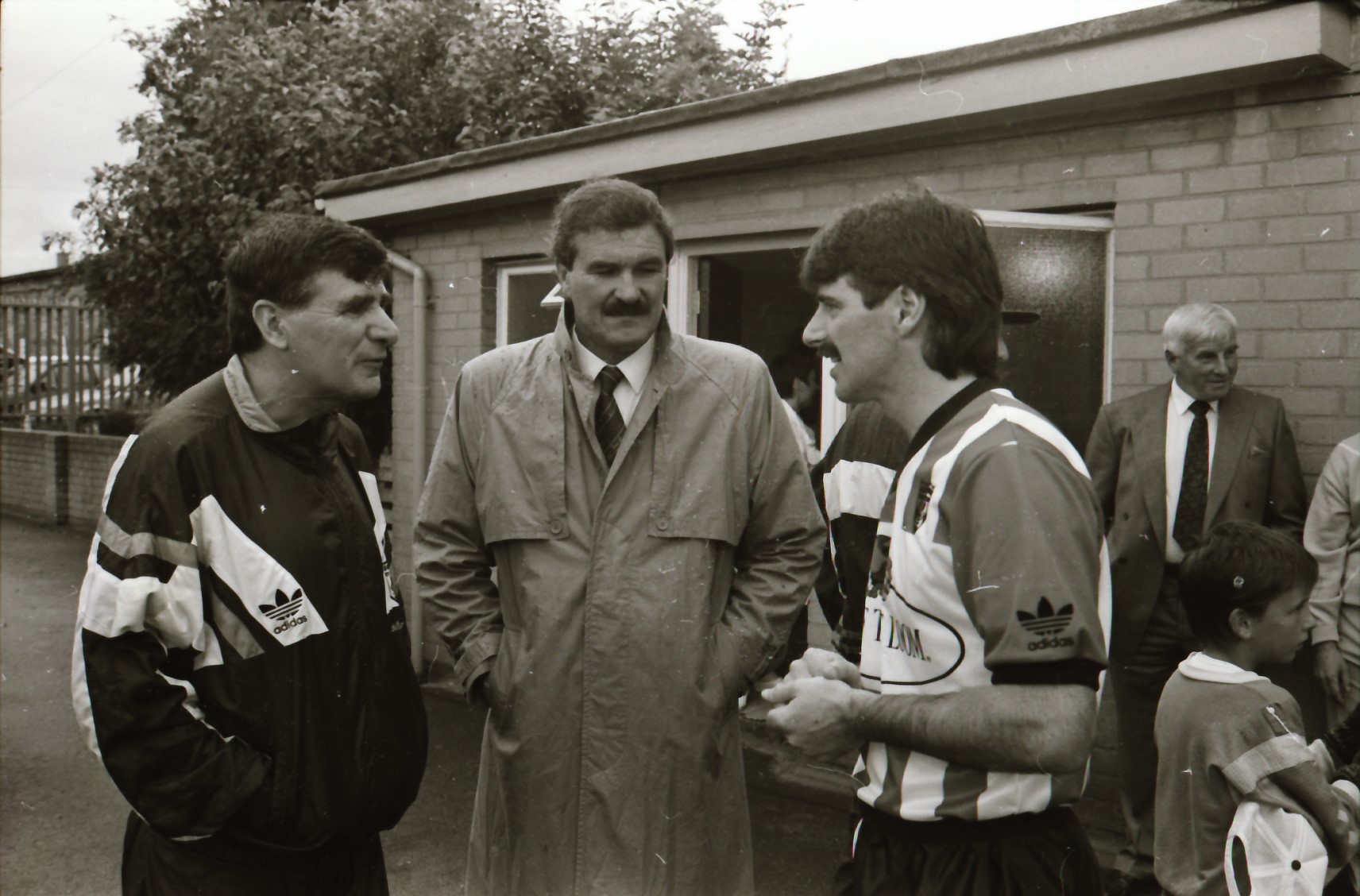
They weren’t willing to stop in Derry, though. You could probably forgive a squad of mostly British players not being too willing to stop for a drink in the North. Too many of the atrocities of The Troubles seemed to occur in or around public houses. Guildford, Birmingham, Greysteel, Loghinisland. Places to go to unwind, to socialise in, were vulnerable targets for sectarianism. So it was decided that they would stop at the first bar the bus passed, crossing the border. Which was The Sequalin' Pig.
I remember one of the only times I heard my mother express fear about the conflict was after the massacre in Greysteel in October 1993. UDA gunmen entered the Rising Sun pub, which was hosting a Halloween party, one of the shooters shouting Trick or Treat before opening fire, killing nine and injuring many more. Mum said that if the killers had driven a few miles further on over the Foyle Bridge and crossed the border, it could have been our local pub “with your Dad sitting in it”.
Now a teacher of secondary school students, I share my experience with classes from time to time. It doesn’t take a degree in child psychology to see the incredulous looks on their faces before dismissing the idea out of hand. And who could blame them? It would be something hard to imagine a team of the scale of United doing now. Football in 1990 is not the same as football in 2025
Nowadays, clubs are corporate entities that strictly control their brand. The idea of a team randomly showing up in a local pub is ridiculous. Players' lives are too carefully managed. Their images are marketable commodities, and whole industries are built around them. A squad of young men out drinking sounds too much like a recipe for online disaster today. The explosion of stories on X or TikTok could make or break careers.
It’s not the only thing to change. FA Cup Final replays are a thing of the past, the drama of penalties now deciding the destiny of trophies. The Troubles, for which there seemed to be no end in sight at the time, would end with the signing of the Good Friday Agreement seven years later. The army checkpoint is long gone at Culmore, dismantled. A row of shops now lines that stretch of road.
-1754583399337.jpg)
That United team would go on to deliver the European Cup Winners Cup that season, beating Barcelona 2-1 (Hughes scored twice, Sealey was in nets). The youthful optimism that characterised that team, the sense of the possible they seemed to possess and which I found almost tangible that night, has given way to the modern corporate behemoth that has the unerring ability to suck the life out of what is supposed to be an entertaining sporting spectacle. And yet I’m still obsessed by them.
I can’t go a day without checking the constant news cycle. It’s an unhealthy obsession, but part of the enthusiasm I have for the club seems to be the way it lets me link back into that awkward yet optimistic teenager who found in football a way to forge his identity.
Subscribe or register today to discover more from DonegalLive.ie
Buy the e-paper of the Donegal Democrat, Donegal People's Press, Donegal Post and Inish Times here for instant access to Donegal's premier news titles.
Keep up with the latest news from Donegal with our daily newsletter featuring the most important stories of the day delivered to your inbox every evening at 5pm.